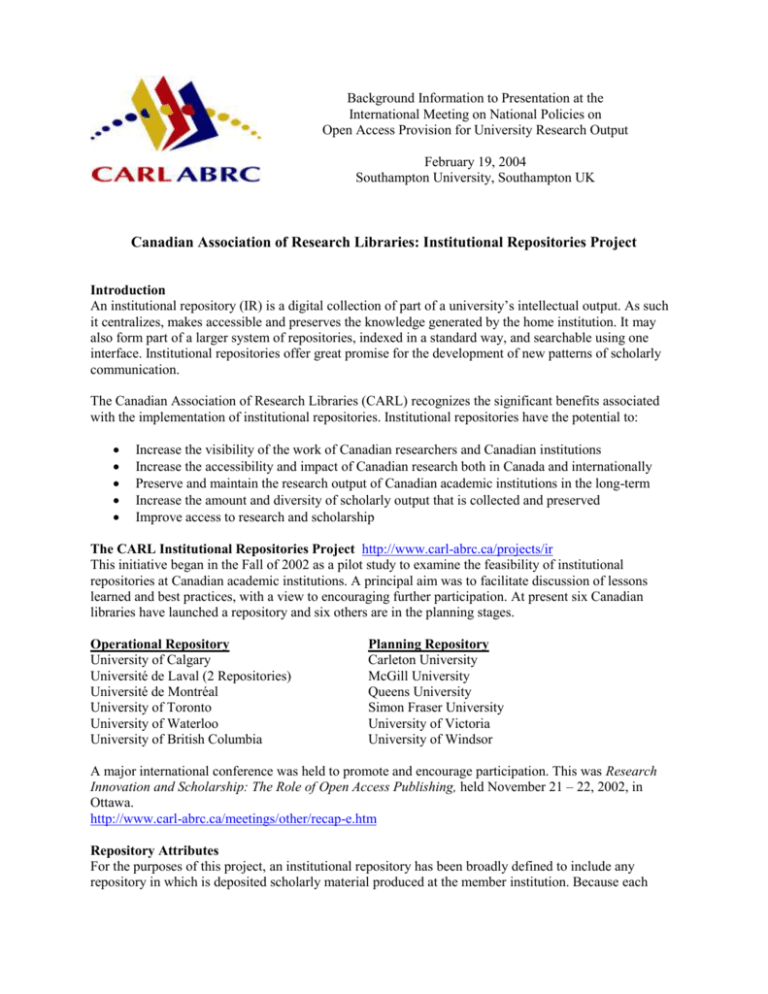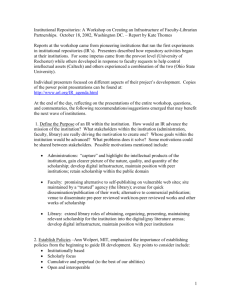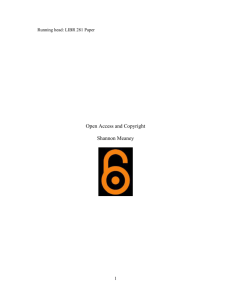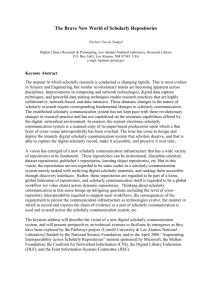Document - Open Citation Project
advertisement

Background Information to Presentation at the International Meeting on National Policies on Open Access Provision for University Research Output February 19, 2004 Southampton University, Southampton UK Canadian Association of Research Libraries: Institutional Repositories Project Introduction An institutional repository (IR) is a digital collection of part of a university’s intellectual output. As such it centralizes, makes accessible and preserves the knowledge generated by the home institution. It may also form part of a larger system of repositories, indexed in a standard way, and searchable using one interface. Institutional repositories offer great promise for the development of new patterns of scholarly communication. The Canadian Association of Research Libraries (CARL) recognizes the significant benefits associated with the implementation of institutional repositories. Institutional repositories have the potential to: Increase the visibility of the work of Canadian researchers and Canadian institutions Increase the accessibility and impact of Canadian research both in Canada and internationally Preserve and maintain the research output of Canadian academic institutions in the long-term Increase the amount and diversity of scholarly output that is collected and preserved Improve access to research and scholarship The CARL Institutional Repositories Project http://www.carl-abrc.ca/projects/ir This initiative began in the Fall of 2002 as a pilot study to examine the feasibility of institutional repositories at Canadian academic institutions. A principal aim was to facilitate discussion of lessons learned and best practices, with a view to encouraging further participation. At present six Canadian libraries have launched a repository and six others are in the planning stages. Operational Repository University of Calgary Université de Laval (2 Repositories) Université de Montréal University of Toronto University of Waterloo University of British Columbia Planning Repository Carleton University McGill University Queens University Simon Fraser University University of Victoria University of Windsor A major international conference was held to promote and encourage participation. This was Research Innovation and Scholarship: The Role of Open Access Publishing, held November 21 – 22, 2002, in Ottawa. http://www.carl-abrc.ca/meetings/other/recap-e.htm Repository Attributes For the purposes of this project, an institutional repository has been broadly defined to include any repository in which is deposited scholarly material produced at the member institution. Because each repository is being built independently of the others, the repositories offer a wide variety of approaches and policies. Most accept a wide variety of content, such as pre-prints, journal articles, conference proceedings; dissertations; and data files. Some repositories are very specific in scope and collect only. theses and dissertations, or only learning objects. The repositories are also collecting material from a diverse set of disciplines, including Education, International Studies, Physics, Law, Medicine, Psychology, Faculty of Education, Philosophy, and Information Science. Likewise, members of the project are implementing a variety of different software packages for their repositories. The DSpace (www.dspace.org) software developed by MIT and Hewlett Packard is the most commonly used. Also used are the EPrints software (www.eprints.org) developed by the Electronics and Computer Science Department of the University of Southampton, and Zope software (www.zope.org) developed by the Zope Corporation. Some libraries have developed their own software. Harvester In Fall 2003, Simon Fraser University in Vancouver implemented a harvester for the project. The harvester is a search service that was developed by the Public Knowledge Project at the University of British Columbia (www.pkp.ubc.ca). The CARL member IRs are compliant with the Open Archives Initiative Protocol for Metadata Harvesting and are harvestable by any OAI harvesting service. The harvester at Simon Fraser University can aggregate the material from the participating Canadian institutions and will allow users to seamlessly search all of the Canadian repositories at once, using one common point of access. Research CARL is also studying the critical factors that lead to the success of an institutional repository. The research will identify whether there exists a causal relationship between particular IR policies or characteristics, and the success of an IR. The variables are being monitored through a survey sent out to the participants every six months. The study, which began in the Fall of 2002, will be long-term. Definitive findings are not expected for some time. CARL Position Statement for Institutional Repositories The CARL membership approved a Position Statement for Institutional Repositories in the Fall of 2003. This Statement expresses the intention of the members of the Canadian Association of Research Libraries “to implement institutional repositories as a coordinated and integrated strategy to aggregate the digital research output of their academic institutions”. It is available at: http://www.carl-abrc.ca/projects/projects/ir/selfarchiving.pdf Future Goals While the project is in the initial stages, the vision is to create a number of content-rich repositories which are interoperable and form the basis of a larger archive of Canadian research output. For more information please visit the CARL Institutional Repositories Online Resource Portal (www.carlabrc.ca/projects/ir) or contact the coordinator of the project, Kathleen Shearer, CARL research associate, at mkshearer@sprint.ca Background Information to Presentation at the International Meeting on National Policies on Open Access Provision for University Research Output February 19, 2004 Southampton University, Southampton UK CARL Research Development Initiative Research Project Optimizing the Transformation of Knowledge Dissemination: Towards a Canadian Research Strategy History and Context For over a decade the Canadian Association of Research Libraries (CARL) has worked to respond to the implications of the technological, economic, and other forces impacting on the scholarly communication process. In 1994 CARL and the Association of Universities and Colleges of Canada (AUCC) formed a joint Task Force on Academic Libraries and Scholarly Communication. The Task Force issued its final report, The Changing World of Scholarly Communication: Challenges and Choices for Canada in 1996. http://www.carl-abrc.ca/projects/scholarly/scholarly_task_force_eng.htm Nearly ten years on, further research is needed to identify and address the root causes. Canadian research libraries play a major role in acquiring, providing access to, and preserving the country’s knowledge base. They need to understand changing research patterns in order to anticipate how best to manage this knowledge. In 2001, CARL commissioned a literature review to identify the major factors affecting the dissemination of scholarly knowledge. The review identified 23 such issues: Technical Infrastructure Document Preservation Content Preservation Digitization Copyright, Licensing and Intellectual Property Metadata Tools and Techniques Interoperability Collection Policies Document Delivery and Interlibrary Loans Managing Digital Libraries Personnel Training and Skill Library Staff Online Learning The Impact of Digital Libraries on Users Impact of Digital Libraries on Quality of Research User Needs Assessment Information Usage Patterns of Canadian Researchers Library Funding Economic Models for Digital Libraries Scholarly Communication and Publishing Globalization of the Information Economy Privatization of Library Functions New Models for Evaluating Research Libraries Access to Digital Libraries for the Visually Impaired Each issue certainly represents a substantial research topic in itself. CARL therefore opted to undertake a further study to identify the most crucial issues and to prioritize them. The result of this process would be to define an agenda for research into the dissemination of scholarly knowledge in the Canadian context. A research team was assembled in the Spring of 2002. The team developed a proposal to the Social Sciences and Humanities Research Council of Canada (SSHRC) under its Research Development Initiative (RDI) programme. The proposal was accepted, and the three-year study began in November 2002. Funding is provided through the SSHRC award and by CARL. The Principal Investigator is Dr. William F. Birdsall (CARL). The two Co-Investigators, are Dr. Jean-Claude Guédon (Université de Montréal), and Dr. Robert E. Babe (University of Western Ontario). They are supported by a team of collaborators and partners. Purpose and Research Questions The purpose of the study is to examine how knowledge dissemination within the scholarly communication system in Canada is being transformed by a variety of factors (drivers) with the goal of optimizing the Canadian response to the impact of these drivers. The study addresses several core research questions: What is the current state of scholarly communication in Canada? How are external drivers transforming knowledge dissemination within the current system of scholarly communication? Is there a need for a specific Canadian research strategy to facilitate the adaptation of the scholarly communication system to this new dynamic environment? If so, what should that strategy be? Methodology and Results to Date Environmental Scan In 2003, the Research Team conducted an initial environmental scan of the current state of the scholarly communication system. In addition, a thorough statistical analysis relating to each of the players within the scholarly communication system in Canada and internationally was undertaken. Based on this scan, the research team prepared a set of background documents. These are available on the study website at: http://www.kdstudy.ca/backs.html Prioritization of Issues and Information Gathering Rather than rely on expert knowledge from consultants or advisory bodies, this study will involve representatives of the major creators and consumers of scholarly research output - the researchers themselves. On January 14, 2004, the multi-disciplinary ten-member Consensus Panel of researchers assembled for an initial one-day conference. Using a consensus conference process the panel identified six crucial issues for knowledge dissemination in the Canadian context: 1. 2. 3. 4. 5. 6. Knowledge Systems Knowledge/Data Storage and Retrieval Knowledge Production and the Social Contract Control, Creativity and Rewards Power and Infrastructure within the Academy Intellectual Property and Copyright In the next phase of the study, a series of expert presentations will be conducted to inform the panel about these issues in more detail. These presentations will also be broadcast in the third week of April 2004 and will be available to the general public via the study website www.kdstudy.ca. From April 20 to May 4, 2004, the investigators will be soliciting feedback from the broader stakeholder community about each of these issues. Consensus Panel Process A key methodology being employed in this study is the consensus conference. This has been used extensively outside Canada to allow the general public to participate in public policy formulation relating to social and scientific issues. However, it has been much less commonly used in Canada, especially in a research context. The methodology has been adapted slightly to meet the particular needs of the study and will be partially conducted through the use of web-based communication systems. Upon completion of the expert presentations the panel will assemble for a final two-day consensus conference. With the assistance of a facilitator, it will formulate a Canadian research strategy for the dissemination of scholarly research. There will be concrete recommendations for achieving such a strategy including: identifying research needs; establishing research priorities; and identifying infrastructure and capacity requirements. The final results from the study are expected in January 2005. For more information please visit the study website www.kdstudy.ca or contact the Principal Investigator: William F. Birdsall Canadian Association of Research Libraries Tel: (902) 835-2821 Email: billbirdsall@accesswave.ca







